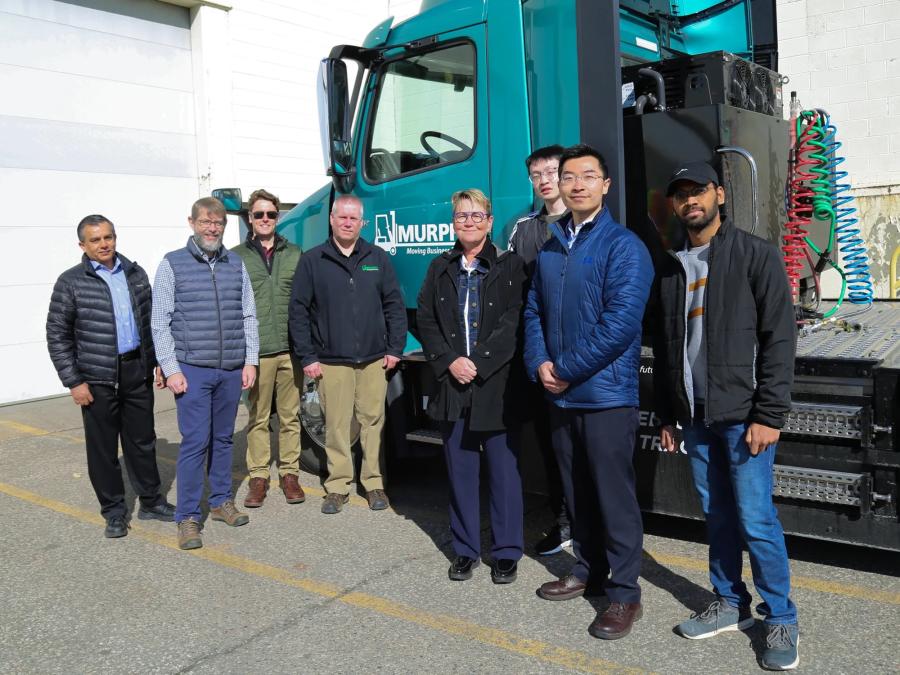Volvo Trucks North America is working with project partners at the University of Minnesota, Murphy Logistics Solutions and H-E-B Grocery Company to conduct extreme weather testing for the Class 8 Volvo VNR Electric model to analyze the impact of ambient temperature on a truck’s battery range.
Volvo Trucks North America is working with the University of Minnesota (UMN) to conduct extreme weather testing for its Class 8 VNR Electric model to analyze the impact of ambient temperature on a truck's battery life. UMN has teamed up with Murphy Logistics Solutions (Murphy) to test the battery-electric trucks in Minnesota with cold winter temperatures and H-E-B Grocery Company (HEB) in Texas to test during periods of intense summer heat.
The extreme weather testing project, which will demonstrate the capability of the Volvo VNR Electric using real-world fleet routes, is part of a battery efficiency for sustainable trucks (BEST) project sponsored by the U.S. Department of Energy's (DOE) Vehicle Technology Office.
The project will track the results of two Volvo VNR Electric engineering trucks with a six-battery configuration that are rated to provide up to 275 mi. of range. Volvo Trucks is analyzing the battery-electric trucks' performance on different routes in extreme temperatures with varying terrains and payload weights to better understand the challenges these factors present to help customers improve route planning and optimization.
Murphy and HEB will operate the battery-electric trucks on freight routes that exceed 250 mi. in a day utilizing drivers in their fleets who have been trained by the Volvo Trucks electromobility team to utilize regenerative braking and other safe driving practices designed to maximize vehicle range. The VNR Electric trucks will leave the warehouse at the beginning of the day with a 100-percent state of charge (SOC) and will ideally return near empty (10-percent SOC) at the end of their routes to take full advantage of useable energy in the battery.
"Volvo Trucks' key to success is always aiming to improve the business value of our trucks for our customers and continuing to develop a positive impact on the total cost of ownership for the Volvo VNR Electric trucks. This research project is a critical step to ensuring the efficiency and reliability of Class 8 battery-electric trucks regardless of the environmental factors," said Keith Brandis, vice president of system solutions and partnerships for Volvo Group. "The results of this testing can be expected to bolster fleets' confidence in the Volvo VNR Electric trucks' reliability and performance in all weather conditions while still providing the creature comforts for drivers."
Similar to battery-electric passenger cars, heavy-duty battery-electric trucks can experience range reductions during extreme temperatures due to battery chemistry where the chemical and physical reactions in the battery can occur more slowly, reducing the BEV's range. To combat that, a dedicated battery thermal management system (BTMS) is included with the Volvo VNR Electric model to manage and maintain the optimum battery temperature range.
The BTMS is a dedicated heating and cooling system connected to the batteries with the purpose of avoiding the chemical reaction slow down or potential cell damage in extreme conditions. This in turn provides long life and excellent performance from the batteries under a variety of weather conditions that the vehicle encounters in real world conditions.
The other significant factor is the use of auxiliary power to either cool or warm the passenger cabin. If the ambient temperature is significantly above or below 70 to 71 degrees farenheit — the average temperature people keep their homes — the driver is more likely to turn on the heat or air conditioning, which draws energy from the battery.
In addition to the severe weather testing, UMN has developed an intelligent energy management system (EMS) connected solution tool to help fleets understand how driving style can impact range, as well as how to take advantage of more energy efficient routing and decrease the cost and time required for on-route battery charging.
The tool uses a machine learning-based algorithm to dynamically inform drivers about available range and minimum charging requirements, taking load and ambient conditions into consideration. The EMS also enables higher efficiency and longer range through advanced eco-route planning. To date, the EMS tool has helped Murphy and HEB achieve more than 20 percent increase in range.
"Collaborating on research projects that will have a direct impact on the viability of battery-electric trucks in extreme weather provides a tremendous opportunity for our faculty and students to not only gain insight into the role that research and development plays in industry but make a real difference in advancing sustainable transportation," said William Northrop, professor of mechanical engineering and director of the Thomas E. Murphy Engine Research Laboratory at the University of Minnesota — Twin Cities. "Most testing in the past has been in a lab setting but now we are working with two fleets to improve real-world route efficiency and driver productivity to validate our data and software. We are excited to evaluate that data for future applications and help Volvo Trucks' customers feel confident in deploying these zero-tailpipe emission trucks in even more regions where they can improve fleet sustainability and local air quality."
Once the research project in both climates is complete, UMN will publish the results in a series of conference and journal papers, in addition to sharing information with U.S. DOE and Volvo Trucks in the form of a final project report.
The two Volvo VNR Electric trucks participating in the field tests are supported by the Volvo Trucks commercial support teams and are maintained and serviced by Nuss Truck and Equipment, the local Volvo Trucks certified electric vehicle dealership in Minneapolis, Minn. Volvo Trucks has a robust network of certified EV dealer partners across North America that have completed the required facility upgrades and rigorous training to service and maintain the Volvo VNR Electric model to ensure peak vehicle uptime, performance, and productivity.
For more information, visit volvotrucks.us/trucks/vnr-electric/.
This story also appears on Truck and Trailer Guide.
Today's top stories











